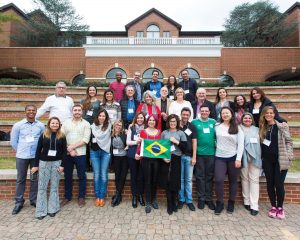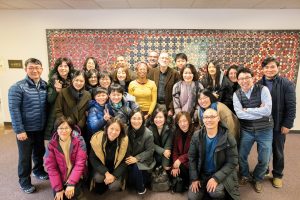
INSPIRATION. REJUVENATION. Sharing a journey together. Delegations from Brazil and Korea made pilgrimages to EMU this past academic year for multi-day programming hosted by the Zehr Institute for Restorative Justice.
Although preparing for such delegations requires a major commitment of time and resources, CJP Executive Director Daryl Byler said that “the payoff is priceless” for all groups involved.
The first such delegation came in 2015 and included six curriculum developers from Nepal’s National Judicial Academy in Kathmandu. CJP anticipates hosting a group from Colombia this next year.
‘LIKE OXYGEN’
From across Brazil and with diverse professional backgrounds, 25 practitioners spent five days visiting Harrisonburg-area programs, contemplating practices and pedagogies, and witnessing shared values.
“It’s like oxygen,” said public prosecutor Danielle Arlé. “I can breathe again.”
“There is an Eastern saying that when the disciple is ready, the master comes,” Judge Leoberto Brancher said. “Restorative justice came to us in Brazil in the late 1990s and now almost 20 years later, we can come before the source … to review what we’ve been doing. It’s a time for tuning and beginning a new stage.”
“The source” is Howard Zehr, professor emeritus and the institute’s co-director, who led a session on restorative justice and serious crimes. Other sessions and site visits were hosted by EMU-educated “disciples.”
Retired judge Isabel Lima, a professor at Catholic University in Salvador, developed the idea for the intensive seminar while a visiting professor at CJP in spring 2017.
In contrast to the United States, where a disparate group is driving the widening influence of restorative justice concepts, the Brazilian judiciary has played a key role in Brazil, Lima said.
Brancher, from Caxio do Sul, is one proponent who has made a nation-wide difference. He talks about restorative justice as an allegorical light during a dark time in his career, when he questioned the efficacy and meaning of his work with incarceration facilities for juveniles. Seen as both a punitive and protective system, “the way those two positions were disconnected made everything we did harmful because of misunderstood conceptions,” he said. “It was an existential question for me: What does life want from me as a judge? And also a professional question: How can I enforce the law? RJ came to me during that period as an answer.”
After nearly 20 years working to advance the concept, the five-day experience at EMU heralded a new stage, he said, towards “the creation of a more solid basis and more integrated leadership to give support and enable this process to be sustainable.”

‘WALKING THE SAME WAY WE WANTED TO GO’
Last year in South Korea, middle school teachers Yongseung Roh and Kyungyun Hwang read Howard Zehr’s seminal text Changing Lenses with a study group. This year, they were part of a South Korean delegation that came to EMU to learn directly about restorative justice from Zehr himself.
“We wanted to meet people who were walking toward the same way that we wanted to go,” the husband-wife duo wrote in an email. The 11-day east coast tour for 21 teachers, students, community leaders and legal professionals was organized by the Korea Peacebuilding Institute (KOPI). Because participants already had a firm basis of RJ concepts, the purpose was to learn about the “spiritual, cultural, and historical backgrounds” of the movement, said KOPI director Jae Young Lee MA ‘03. “If we believe RJ is a paradigm and not a program, it is important to know the Anabaptist/Mennonite tradition emphasizing peace and justice as a center of their faith.”
The visit was also an opportunity for “two-way” learning, said CJP executive director Daryl Byler – for both CJP staff and graduates like Lee and fellow delegation participant Yoonseo Park MA ‘16.
“They and others have taken the restorative justice training they received at CJP and expanded its application to a variety of Korean contexts – including the criminal justice, educational and health systems, as well as in housing and church conflicts,” Byler said.
The delegation also visited the Mennonite Central Committee headquarters and Material Resources Center in Akron, Pennsylvania; met with shooting victims and family members in the Nickel Mines Amish community; and visited two Washington D.C. schools that practice restorative discipline.
IN THE FUTURE…
Members of the Brazil delegation are exploring attendance at a future Summer Peacebuilding Institute, and staying in touch through online forums and webinars.
CJP and KOPI have signed a three-year Memorandum of Understanding. The partnership will strengthen the regional capacity for peacebuilding in Korea and cross-promote CJP-KOPI professional trainings in restorative justice and trauma and resilience, as well as academic programs.